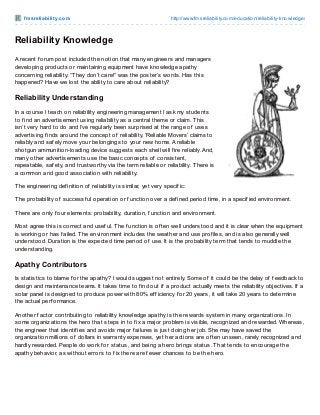
Reliability knowledge FMS Reliability
- 1. f msreliabilit y.com http://www.fmsreliability.com/education/reliability-knowledge/ Reliability Knowledge A recent f orum post included the notion that many engineers and managers developing products or maintaining equipment have knowledge apathy concerning reliability. “They don’t care!” was the poster’s words. Has this happened? Have we lost the ability to care about reliability? Reliability Understanding In a course I teach on reliability engineering management I ask my students to f ind an advertisement using reliability as a central theme or claim. This isn’t very hard to do and I’ve regularly been surprised at the range of uses advertising f inds around the concept of reliability. ‘Reliable Movers’ claims to reliably and saf ely move your belongings to your new home. A reliable shotgun ammunition-loading device suggests each shell will f ire reliably. And, many other advertisements use the basic concepts of consistent, repeatable, saf ety, and trustworthy via the term reliable or reliability. There is a common and good association with reliability. The engineering def inition of reliability is similar, yet very specif ic: The probability of successf ul operation or f unction over a def ined period time, in a specif ied environment. There are only f our elements: probability, duration, f unction and environment. Most agree this is correct and usef ul. The f unction is of ten well understood and it is clear when the equipment is working or has f ailed. The environment includes the weather and use prof iles, and is also generally well understood. Duration is the expected time period of use. It is the probability term that tends to muddle the understanding. Apathy Contributors Is statistics to blame f or the apathy? I would suggest not entirely. Some of it could be the delay of f eedback to design and maintenance teams. It takes time to f ind out if a product actually meets the reliability objectives. If a solar panel is designed to produce power with 80% ef f iciency f or 20 years, it will take 20 years to determine the actual perf ormance. Another f actor contributing to reliability knowledge apathy is the rewards system in many organizations. In some organizations the hero that steps in to f ix a major problem is visible, recognized and rewarded. Whereas, the engineer that identif ies and avoids major f ailures is just doing her job. She may have saved the organization millions of dollars in warranty expenses, yet her actions are of ten unseen, rarely recognized and hardly rewarded. People do work f or status, and being a hero brings status. That tends to encourage the apathy behavior, as without errors to f ix there are f ewer chances to be the hero.
- 2. Yet another f actor may be the specialization of engineering work. The mechanical engineer f ocuses on material strength, f astening options, and ef f icient transf er of energy or motion. The electrical engineer f ocuses on power consumption, circuit speed, and timing. A system’s f an is of ten overlooked as a component other than airf low to produce cooling f or the system. The f an is a complex electromechanical device that is neither the domain of electrical engineers – they provide it power and benef it by the cooling; nor the domain of mechanical engineers – they provide support, attachment and location. Neither spends the time to address the selection of the f an related to the f an’s reliability, which results in f ans being a common element of the design that f ails. Neither specialized engineer has the knowledge to address the cross-discipline elements at play in the f an. Of course time to market, throughput, cost and management priorities all contribute to the apathy. The rewards, directives, encouragements and priorities of ten do not include any aspect of reliability. Building Reliability Knowledge So, what do we do? How can we diminish the apathy around reliability? I do not exactly know and have only a f ew suggestions. As I continue to work with teams and learn what works to instill a passion f or reliability I’ll update this blog, yet in the meantime, here’s what I’ve seen make at least some dif f erence: 1. Awareness – let others know the engineering def inition of reliability and articulate it clearly f or your projects. 2. Value – use reliability-engineering tools that enable decisions. 3. Goals – set and track progress toward meaningf ul reliability objectives. 4. Success – document and celebrate the successf ul avoidance of reliability problems (not just the hero). 5. Math – embrace the math around reliability statistics. Talk with data. 6. Generalize – work with specialists to f ind gaps in system reliability understanding. There are more ways to avoid or reverse reliability knowledge apathy. What have you f ound that works? What are your success stories?
